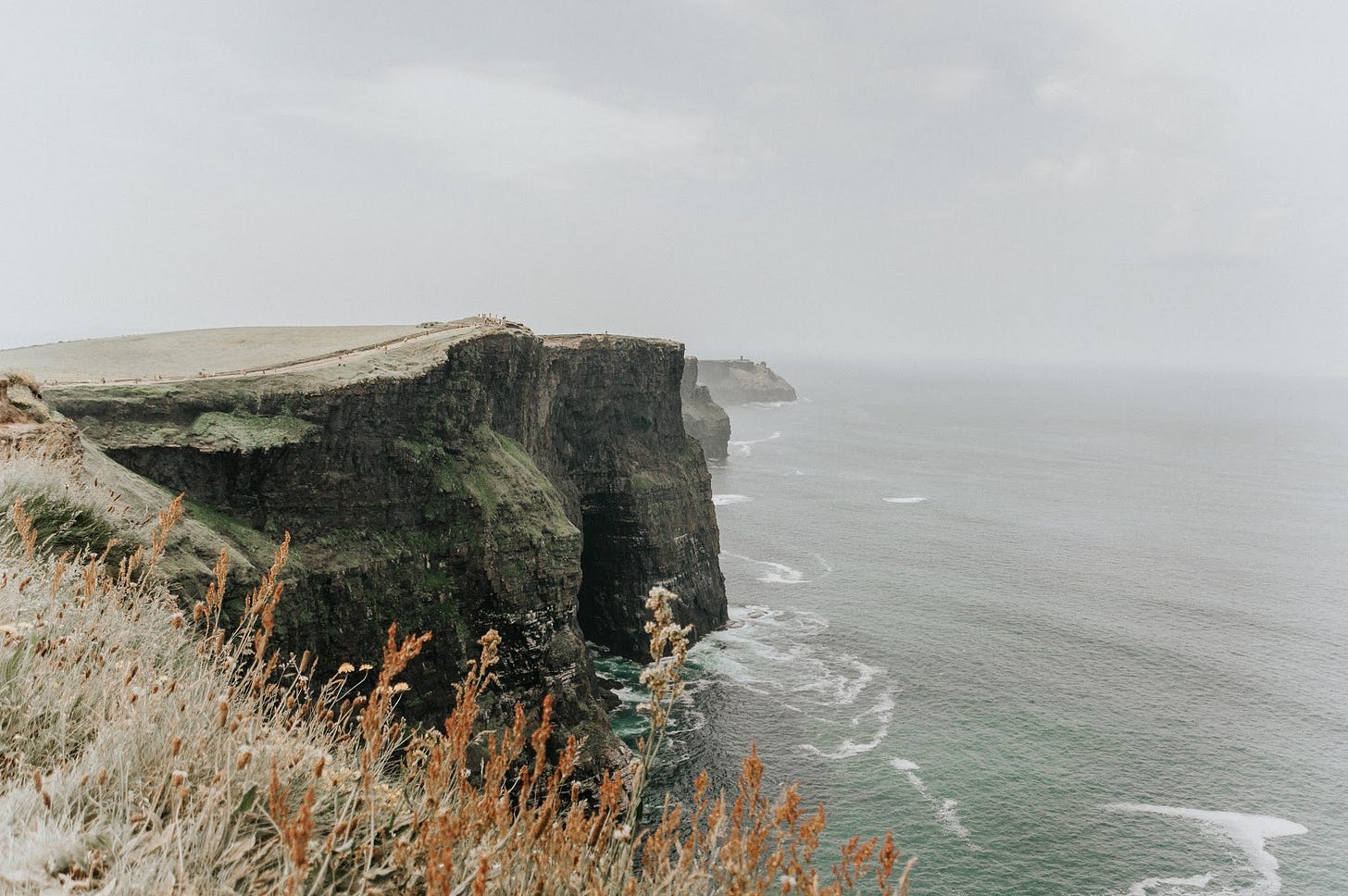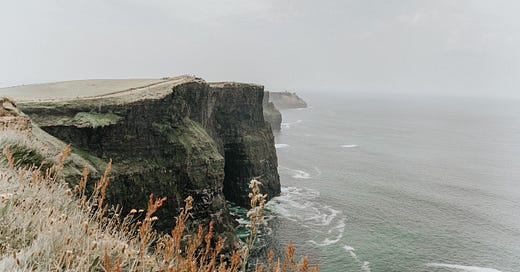It’s the end of the world, and I’m pregnant
Will our daughter be glad that she was born, or resent the reality she inherited?

If you had asked me at various points over the past decade whether I wanted to have a child, I would have told you I wasn’t sure. Throughout my 20s and early 30s, I’d go back and forth on the matter.
Now here I am, 35 years old and two months from my due date. The choice has officially been made.
Debating whether to have children was less about my feelings on motherhood and more about ethics. In today’s resource-strapped world, is having children one of the most selfish things a person can do, or is it an incredible act of hope for the future?
Billy and I were ultimately swayed by the latter.
I wish I could say that I’m completely confident in the choice we made, but that’s not true. The COVID-19 pandemic has made a complicated decision even more fraught. There are plenty of nights when I lie awake, worried about what the world is like now and what it will look like in 5, 10, 20 years—when our daughter is older and contemplating her own future.
Will she be glad that we decided to become parents, or resent the reality that she inherited?
The argument not to have children is a strong one. That’s why I felt so shaken after reading Sian Cain’s article, “Why a generation is choosing to be child-free.” She writes:
Sometimes I suddenly want a daughter with the same staggering intensity my father felt when he first cradled my tiny body in his big hands. I want to feel that reassuring weight, a reminder of the persistence of life.
Then I remember the numbers. If my baby were to be born today, they would be 10 years old when a quarter of the world’s insects could be gone, when 100 million children are expected to be suffering extreme food scarcity. My child would be 23 when 99% of coral reefs are set to experience severe bleaching. They would be 30—my age now—when 200 million climate refugees will be roaming the world, when half of all species on Earth are predicted to be extinct in the wild. They would be 80 in 2100, when parts of Australia, Africa and the United States could be uninhabitable.
Yikes. It’s hard to read those predictions as a relatively young human living on this Earth. It’s even harder to read those words as my unborn child shifts around in my stomach, reminding me how little and helpless she is.
Some days, when I let my anxious brain take charge, it’s easy to convince myself that the end is near. I feel little and helpless, too.
Some of my favorite people are happily child-free. My second cousin, Kerry, has written about her decision not to have children. Two of my closest friends are on a path to save enough money for early retirement—one that doesn’t include kids, but does include plenty of travel. I’ve looked up to countless child-free people over the years who seemed more content and carefree than their peers who were parents.
Thankfully, I also know and love plenty of people who have children, and are happy with that choice—even amidst the challenges of the pandemic. They have reasons to get out of bed and plan fun activities. They get to witness the joys and innocence of early childhood. Those with older children have the comfort of knowing they have someone to take care of them as the years pass.
To me, there are solid arguments on both sides, and I get frustrated when I see child-free adults and parents pitted against each other. The people who choose not to have children are accused of being selfish and thinking only of themselves. Those who do choose to have children are blamed for exactly the same thing. We point fingers and make judgments, and leave little room for nuance.
Instead, we should be angry at the ways that so many systems and leaders are failing us. The future feels more uncertain than ever. We can no longer rely on financial or health care safety nets like we used to. Nowadays, even the choice to send your child to school—something many of us never even thought to question—is fraught with fears and complications.
A few days after reading Cain’s article, I picked up R. Eric Thomas’ book, Here For It: Or, How to Save Your Soul in America. One of his essays, “The Past Smelled Terrible,” was particularly comforting. If Cain’s essay was a strong shot, then Thomas’ words were the smooth chaser:
The problem is doomsday isn’t coming. And I don’t think we can turn back the hands of time or whisper to the cloud of dust, as much as I’d like to. I think we’re obsessed with dystopian or apocalyptic scenarios because, despite their darkness, they’re comparatively easy outs. Kind of like how sometimes you wish your company would just go out of business so that you’d have to go on unemployment and finally finish your novel or paint the study or hike the Appalachian Trail like you’ve always wanted. Actually living, getting up every day with all the fears and tragedies and challenges and potential joys of being a human in regular old neutral-smelling, depressing times, is hard enough.
But it’s what we’re given: flowers and sunshine and push alerts on our phones and midterm elections; pop-up restaurants and flawed history books and strangers in offices who become parts of our lives. There’s fighting for social justice and being brokenhearted about deaths that could have been avoided and being terrified about bringing a kid into this world and being even more terrified about leaving a kid in this world and trying to figure out how to wake up every day not thinking that the world is going to end. Even though it will. I’m here for that. That mid-topian life.
Cain is right: If we go on living in the same unsustainable ways, the future looks especially bleak. Thomas is right, too: The simple fact that we go on living is hopeful in itself. There’s proof that the vast majority of people are committed to fighting for what’s right and figuring out the path ahead.
The way we talk about parenthood is often an alienating, all or nothing, experience. Women say that they always wanted to be mothers. Fathers swear that you never regret your decision to have children. People say that being a parent is either the best thing ever, or the hardest job in the world.
I’m not yet a parent, but I suspect that the reality is somewhere in between. Parenthood, like anything else in life, isn’t black or white. It’s a whole lot of gray—the good and the bad, the joy and the heartache, the pleasure and the pain all mixed together.
The same applies for the future. Yes, climate change is terrifying. We need to make swift and major changes to fix our environmental damages. Yes, the never-ending coronavirus pandemic is maddening. Lately, we’re faced with an endless array of options for how to carry on our lives, none of which are particularly safe or comforting. Yes, it seems like we’re more divided and on edge than ever. I worry all the time about the mental health effects of the prolonged stress and isolation we’re experiencing.
And yet, there are still reasons to get up each morning and continue trying. We keep fighting.
I have no choice but to be hopeful these days. I do what I can to turn the tide for the better. I donate to causes I believe in. I vote. I write this newsletter, and have meaningful conversations with friends. I practice empathy and patience whenever I can. I try to make environmentally conscious decisions. I read and learn and challenge myself to keep an open mind. I buy stamps and send letters through the USPS!
I don’t know what my daughter’s childhood will look like. I know better than to passively assume that it will be easier than mine. Still, I hope that it will be, however stubborn or unrealistic that may seem. I may not be able to singlehandedly change the world, but I can always do what I can to make her world brighter.
xoxo,
KHG
To have kids or not to have kids?
This is a delicate issue. The choice to have children isn’t a simple one, and there are a ton of factors that come into play. Sometimes we want children and can’t have them, for a variety of reasons. Sometimes we can’t make up our minds. Sometimes we are confident in our decision to be child-free, but are nervous to speak out about it.
I’d love to hear your stories about deciding to become parents or remain child-free. If you’re on the path to possible parenthood, I’m eager to hear about that, too, though I recognize that it might be a painful topic.
I’ll compile some of the top responses in Thursday’s subscriber-only newsletter. Like always, I will treat your replies with respect and discretion; you’ll be credited by first-name only, and if you prefer to remain anonymous, I’ll be happy to do that.
Share your stories by replying to this email, leaving a comment, or sending me a message. I can’t wait to read your thoughts.
My Sweet Dumb Brain is written by Katie Hawkins-Gaar. It’s edited by Rebecca Coates, who cannot wait to welcome Katie to motherhood—and all its ups, downs, and gray-areas. Photo by Maddie Leopardo on Unsplash.
Want to support this newsletter? You can subscribe, tell a friend about it, or hit that heart button at the top or bottom of this post. It all helps!
This newsletter contains a Bookshop.org affiliate link.





I really resonated with the article from the HuffPost. I have never had the motherly instinct and when I tell my friends that I never pictured myself having kids or have the desire to everyone gives me a judgmental look or tells me I'll change my mind. I am in my 30s and still feel this way. A close friend of mine who is married also shares the same feeling and has pressure from her family to one day have kids. We were recently talking about how there aren't enough articles or discussion around that is it ok for women to not want to have kids and to not feel shame. This newsletter came at a perfect time.
Parenthood is definitely a mixed bag. The honesty in this post is so inspiring and much needed in the discussion about pregnancy, child rearing and the value arbitrarily assigned to both. My wife and I just welcomed our third child during these pandemic and like each child before, it’s been a totally different and unexpected experience. I look at our friends without kids with envy during this pandemic especially, and they look at us the same. The most value IMHO lies in being happy with whatever decision you make and I think that can only come when you’ve made the decision for yourself rather than expectation or pressure. If only parenthood were as simple as a choice.